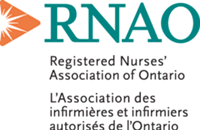New guideline edition released to support people with diabetic foot ulcers
TORONTO, Oct. 17, 2024 /CNW/ - To better support people at risk of or living with a diabetic foot ulcer (DFU), the Registered Nurses' Association of Ontario has released the new edition of its renowned best practice guideline (BPG): Diabetic Foot Ulcers: Prevention, Assessment, and Management (Third Edition).
The guideline provides updated evidence-based recommendations for nurses and other health providers, and people at risk of or living with diabetic foot ulcers (DFU) on how to prevent, assess and manage DFUs.
"Diabetic foot ulcers are one of the most common and serious complications of diabetes and up to 34 per cent of people with diabetes will develop a diabetic foot ulcer during their lifetime," says RNAO CEO Dr. Doris Grinspun. "To help nurses and others work effectively to prevent and manage DFUs, we brought together a panel of experts including a person living with diabetes, clinicians, researchers and educators. The result is a new edition guideline that will continue to improve wellbeing and quality of life for many in Ontario, Canada and around the globe."
The guideline outlines good practice statements and recommendations related to:
- providing diabetic foot screening for persons living with diabetes (e.g., screening, providing education)
- assessing the DFU
- creating a plan of care with the person living with a DFU and their care partners that includes evidence-informed management options
- enabling specialized wound care teams to support persons at risk of or living with DFUs
- supplementing in-person DFU services with virtual care platforms
The BPG's interprofessional expert panel was co-chaired by Mariam Botros, CEO of Wounds Canada and Dr. Kevin Woo, professor at the Faculty of Health Sciences, School of Nursing for Queen's University.
"Diabetic foot ulcers are a serious complication that can lead to amputations, but four out of five amputations are preventable with the right care," says co-chair Botros. "These guidelines have a tangible impact in our practice, allowing us to improve the wellbeing and quality of life for individuals, ease the financial burden on our health system and support equitable care."
"To ensure the credibility and feasibility of the recommendations, we followed RNAO's rigorous guideline methodology to appraise the best available evidence and exchange our expertise and experiences," says co-chair Woo. "This BPG brings to light the new evidence and practical 'nuggets' for the prevention, assessment, and management of diabetic foot complications through the equity lens within a Canadian context. It is a benchmark and catalyst for policy change through advocacy and leadership."
The BPG is available for free download on RNAO's website. It replaces two previous RNAO BPGs: Reducing Foot Complications for People with Diabetes published in 2007 and Assessment and Management of Foot Ulcers for People with Diabetes published in 2013.
RNAO's Best Practice Guideline (BPG) Program is funded by Ontario's Ministry of Health. It was envisioned by CEO Dr. Doris Grinspun in 1998 and launched in 1999 to provide the best available evidence for patient care across all health sectors and settings, with more than 50 guidelines developed to date. The Best Practice Spotlight Organization® (BPSO®) program supports health service and academic institutions that have formally agreed to implement multiple RNAO BPGs over a three-year period, and evaluate their impact on patients, organizations and health system outcomes. Launched in 2003, the BPSO program now has more than 1,500 BPSOs in Ontario, Canada and internationally.
The Registered Nurses' Association of Ontario (RNAO) is the professional association representing registered nurses, nurse practitioners and nursing students in Ontario. Since 1925, RNAO has advocated for healthy public policy, promoted excellence in nursing practice, increased nurses' contribution to shaping the health system, and influenced decisions that affect nurses and the public we serve. For more information about RNAO, visit RNAO.ca or follow us on X (formerly Twitter), Facebook, Instagram and LinkedIn.
SOURCE Registered Nurses' Association of Ontario

For more information, please contact: Victoria Alarcon, Communications Officer/Writer Registered Nurses' Association of Ontario (RNAO) 1-800-268-7199 ext. 211 416-408-5610 [email protected]; Marion Zych, Director of Communications, Registered Nurses' Association of Ontario (RNAO), 1-800-268-7199 ext. 209, 416-408-5605, 647-406-5605 (cell), [email protected]

Share this article